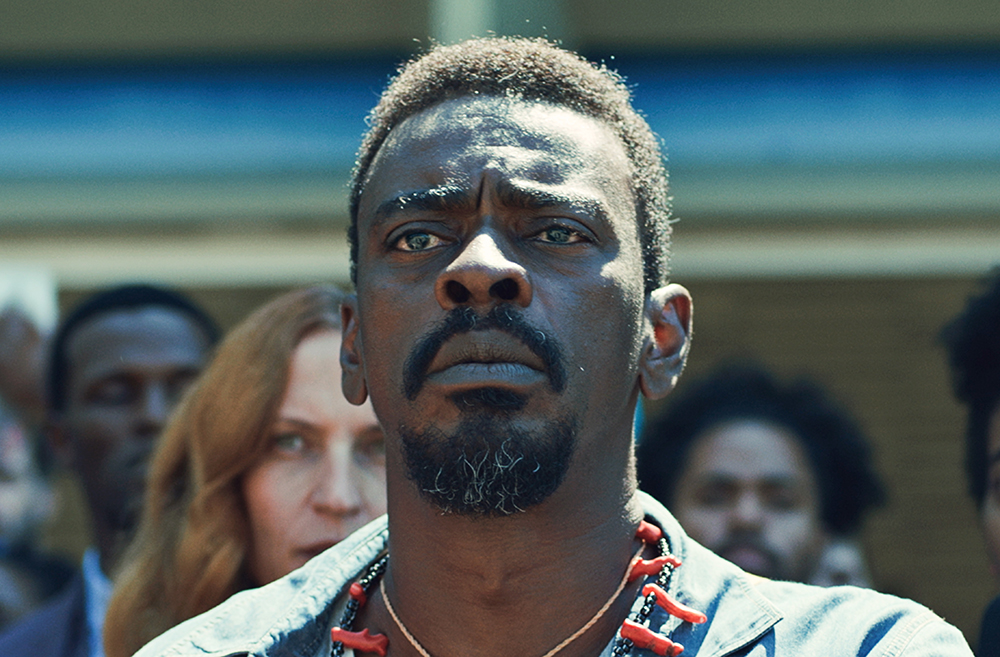“Executive Order” is hard to watch. What makes it so is its twofold narrative: one minute, we’re shown a kind Brazil, and beautiful Brazil, and the next things have devolved into a deportation scene reminiscent of Nazi Germany. But what is even more hideous is that the way the film lets you in on the seething hatred of Black people in “Executive Order’s” Brazil: a Black journalist André (Seu Jorge) has a heated debate about some of Brazil’s politics, and remarks that sometimes he loves Brazil, and sometime he hates it. “If you don’t like it, leave,” a White patron urges in racist speak often mirrored in modern society.
Before long, after his cousin Antônio (Alfred Enoch) urges Brazil for reparations for slavery, he is answered by the government in the form of “social reparations”—at first anyone who is “high melanin” (Black-skinned) is offered to be moved back to Africa cost-free; but soon we see a government policy, the ‘executive order,’ that forces them to be deported in violent roundups that lead to beating and some deaths. These are led by a heartless government employee (Adriana Estevez) and the ‘Minister,’ who remark with cold detachment that if some ‘high melanins’ don’t leave, they’ll eventually die, making it less costly on the government to rid themselves of them. The effect is starting and shocking: it’s hard to watch “Executive Order” and not be outraged by the proceedings.

The acting in the film is very well done, as is the tone of the film. The Black vs. White world is shown to us initially through André, who, confronted with daily racism, makes jokes about it and laughs it off. It’s clear he deals with it, but never suspects that he will be the subject of government-sanctioned genocide. When it is clear things mean to go that way, he’s the voice of reason: Antônio thinks laws will save him (being a lawyer), whereas André realizes laws don’t apply to racially targeted out-groups.
Joining these two, Antônio’s girlfriend Capitu (Taís Araújo), and a helpful neighbor (Mariana Xavier) add necessary drama to the proceedings. Capitu is a doctor; and, forced into a new rendition of an Underground Railroad, she becomes a voice for the voiceless. A scene where she frustratedly explains to a White would-be ally that ‘she has a right to be distrustful, she has a right to be angry, and she has a right to guarded’ is one of the most powerful pro-civil rights speeches I’ve heard in film. Araújo inspires, and I’d love to see her awarded with a ‘Supporting Actress’ nomination for this film come Grand Jury time. Jorge is pleasing as well; I loved the scenes with him, and he is a true high point of the film for his sincerity, lovability, and charm.
The villainous Minister and his colleague also deserve recommendation—you truly hate them, and, in a film like this, that takes a decided amount of skill. The score is also doleful and captivating, edging the film on, even though the violence going on on-screen more than enough lets you know how desperate times are.

The film loses some of its efficacy for two reasons. Firstly, there’s the fact that its climax offers a lot of desperation with little hope. This is not a film like “Eslysium” where the hero blows up the elitist city and undoes generations of oppression; in “Executive Order” we’re witnessing the beginning, and during its run there’s not a lot to hope for.
The second issue is unlike these aforementioned dystopian films, Black out-grouping is already a problem that many countries in the world face. Much of the rhetoric spread by the villains in this film is not absurd, or out of left field, but mirrors talking points spoken by members of white supremacist groups and alt-right politicians. One utters, while saying horribly racist things, that “everyone calls everyone racist these days,” absolving herself from the noxious things she’s saying, while the lead deporter insinuates it’s really the ‘high melanins’ who hate. It’s wholly disturbing because it’s so real. These phrases are hurled by racists daily; is “Executive Order” really that far off?
But, what hurts most about “Executive Order” is the film offers problems but not solutions. Without spoilers, it ends on notes that are hard to swallow. It’s painful and hard to watch—the hallmark of important cinema—but doesn’t go far enough. The closing shots offer more revelry and ceremony than I found appropriate. But, under this, the film does its job well. Through pain and hardship, its presents a startling and eye-opening picture that one can only hope will eventually lead to a global wake-up call.
*Note: Lázaro Ramos, director of “Executive Order,” will be doing a public LiveChat on the film’s SXSW film page on Thursday, March 18th at 5 PM CDT. The film premiered on 3/16 and will be available to ticket holders and press until 3/21 at 1 AM CST.


